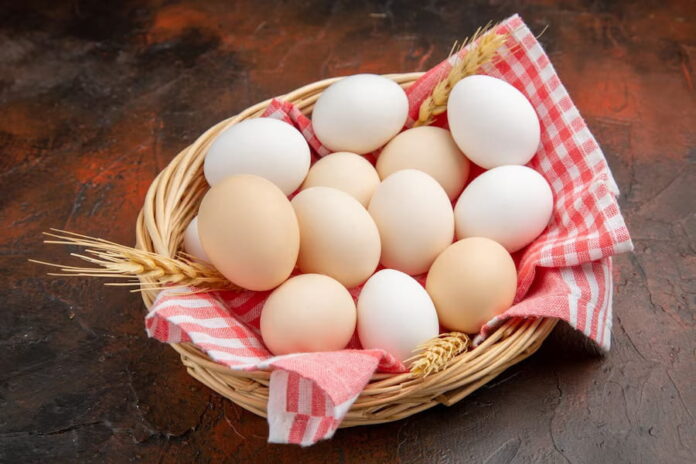EGGS : A Real Basket for Healthy Nutrients
Sushma Kumari1, Nalin Parmar2, Sanjay Kumar3 and Nitu Sourya4
1,2,4 Dept. of LPT, Bihar Animal Sciences University, Patna
3, Dept. of LPM, Bihar Animal Sciences University, Patna
Eggs are a highly nutritious and versatile food that provides an array of essential nutrients and having least chances of being adulterated. It is the cheapest source of good quality non-vegetarian protein, vitamins and minerals for nourshing our health. The nutritive value of eggs can vary slightly based on the species of poultry and the diet of the laying birds, but didn’t vary due to egg shell colour in same species. There is not any nutritional difference between white and brown coloured same size egg of hen but may differ in content of hormones and chemicals due to difference in their management and rearing system. Egg white is very good for health because it contains good proportions of protein and very less fat. Most of the fat are although located in their yolk, but it is also health beneficial. So, consuming regularly egg in diet is a need to maintain good health and overcome aging.
Here’s a breakdown of the nutritive value of different types of eggs:
- Chicken Eggs: Chicken eggs are the most common and widely consumed type of eggs. They are an excellent source of high-quality protein, containing all essential amino acids necessary for the body. Additionally, eggs are rich in vitamins such as B12, B6, and D, as well as minerals like selenium, zinc, and iron. The yolk contains healthy fats, including omega-3 fatty acids, which are beneficial for brain and heart health.
- Duck Eggs: Duck eggs are slightly larger than chicken eggs and have a thicker shell. They have bigger yolk than hen egg. They are also a good source of protein, vitamins B- complex, Vit D and Vit. E. Duck eggs contain more fat than chicken eggs, particularly in the yolk, which results in a creamier texture and a richer flavor. The higher fat content means they also contain higher amounts of fat-soluble vitamins like A, D, and E. Duck eggs are good for improving vision, lusture of skin and growth of hair. It is also beneficial in preventing several types of disease or disorders such as heart and liver diseases and immunity disorders.
- Quail Eggs: Quail eggs are although much smaller than chicken eggs but pack a similar nutritional punch. They are rich in protein, vitamins (B2, B12, and folate), and minerals (iron, phosphorus). Quail eggs have a higher yolk-to-white ratio compared to chicken eggs, which means they are slightly higher in calories and fat. It has about 13% more protein than recommended daily allowance,
- Goose Eggs: Goose eggs are larger than chicken eggs and have a higher fat content, especially in the yolk. This makes them richer and creamier, but they also contain more calories. Goose eggs are an excellent source of essential nutrients like protein, vitamins, and minerals such as Phosphorus and Zinc.
- Turkey Eggs: Turkey eggs are less common but still nutritious. They have higher nutritional profile than chicken eggs, providing high-quality protein, vitamins, and minerals. The taste is comparable to chicken eggs, but some people find them slightly milder. These eggs are good for better growth of muscular tissue, skin health and vision and also helpful in improving memory and immunity and slowing down aging .
Table: Comparison of Nutritive Value of 100g of Different Types of Whole Egg of Different Species
| Components | Chicken | Quail | Duck | Turkey | Goose |
| Calorie | 147 | 158 | 185 | 171 | 185 |
| Total fat | 9.9g | 11.1g | 13.8g | 11.9g | 13.3g |
| Saturated fat | 3.1g | 3.6g | 3.7g | 3.6g | 3.6g |
| Cholesterol | 423mg | 844mg | 884mg | 933mg | 852mg |
| Carbohydrate | 0.8g | 0.4g | 1.5g | 1.2g | 1.3g |
| Protein | 12.6g | 13.1g | 12.8g | 13.7g | 13.9g |
| Vit.A | 487IU | 543IU | 674IU | 554IU | 650IU |
| Calcium | 53mg | 64mg | 64mg | 99mg | 60mg |
| Iron | 1.8mg | 3.6mg | 3.8mg | 4.1mg | 3.6mg |
| Sodium | 140mg | 141mg | 146mg | 151mg | 138mg |
Overall, eggs, regardless of the type, are a valuable addition to a balanced diet. They offer a range of essential nutrients that contribute to various bodily functions and promote overall health. As with any food, moderation is key, and individuals with specific dietary restrictions or allergies should consult their healthcare provider before including eggs in their diet.
USING EGGS AS WEAPONS IN FIGHT AGAINST HUNGER & MALNUTRITION IN INDIA


